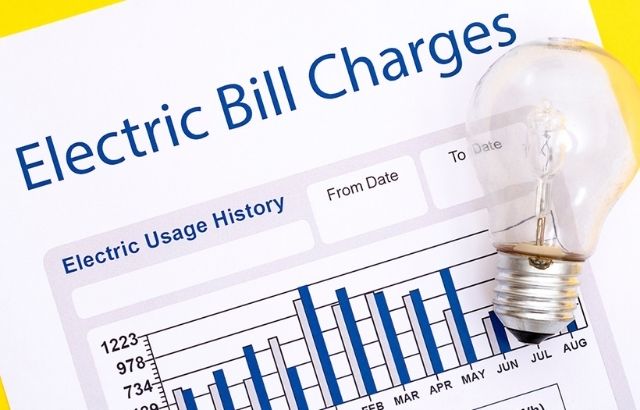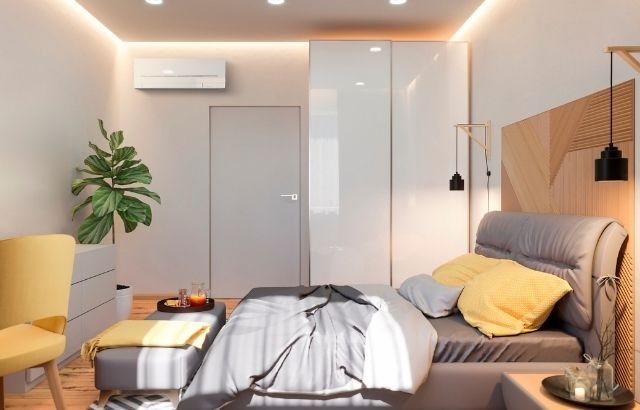Rent is a predictable and straightforward rate in the U.S, but apartment services like power, natural gas, water, cable, and internet are not always so. Although some utilities may be included in your Rent, it’s essential to know how much you should budget for them. You will get an idea of how much you should pay by doing some research ahead of time, based on your state. For example, if you live in the northern states, not using air conditioning during the summer months will save you money on utilities, but you will spend more money on gas bills in the winter. So, let’s find out what is the average electric bill for 1 bedroom apartment. The average electric bill for 1 bedroom apartment is roughly $90
The energy provider will send you a statement with a rundown of your electricity use per month. If you do have one utility provider, you will merge the electric and heating bills. Still, for this discussion, let’s stick to electricity.
Your energy bill in a one-bedroom apartment would most likely be between $35 and $52 per month. That’s assuming you don’t have the air conditioning on at this period, which means either you don’t have air conditioning or it’s winter. If that describes you, then this figure is correct.
If you’re new to freedom, you’re still working out one of the most critical aspects of your new life: your budget. Money is spent on stuff. It’s a lesson that many people discover the day they move into their first average electric bill for a studio apartment. To survive, you must learn to invest your money and use it wisely. However, when you’re going over your line items and calculating your monthly costs, there’s one cost that you haven’t thought of in your plans. It is about your electric bill.
Read More:
What is the Average Electric Bill for an Apartment?
Electricity per month for one person is expected to be one of the most expensive monthly power bills. The average American spends 41% of his or her energy on room heating and cooling and 35% on appliances, electronics, and lighting. Depending on the number of people in your home, the state in which you rent, the number of devices and electronics that use electricity, and the size of your apartment, you’ll spend more or less. The apartment cost of electricity depends on those aspects.
How Much Does the Average Internet Bill Cost?
Most households need internet access, and there are several services available nationally. Prices for internet access range from $20 in states like Arizona, Oklahoma, and Nevada to $50 in Alaska and South Dakota. Rates can, of course, vary based on the utility company and package you choose.
If you like cable TV, you can order it individually or as part of a package. The typical broadband and cable bill start at $36 when you buy a package. On the other hand, streaming networks could be a less expensive option; if you have a high-speed broadband connection, you might forego cable TV and stick to the internet instead.
In an Apartment, what Consumes the Most Electricity?
The air-conditioning machine is likely to be the appliance that consumes the most energy in an apartment. The amount of time your air conditioner is used is determined by the season, where you live, and how cool you want to be in your space. If you live in a colder climate, you’ll probably use air conditioning during the summer months when opening the windows isn’t enough to keep you hard.
So, if you need some hot and nice house weather, you will find that the average cost of doing so offsets the disparity in expenses in colder states. Take also into account your place’s square footage.
Accessories that can help you save money on your energy bill
Here are few resources you can use to make your bill more affordable, making your condo living experience even better.
How Can You Reduce the Electrical Bills?
Use smart power strips
Smart power strips are an excellent way to reduce the effect of phantom loads on your energy bill. These systems minimize the amount of wasteful standby electricity cost consumed by electrical devices that are constantly plugged in. By connecting your TV, phone, and every other high-energy-consumption gadget to a smart power strip, you can save money on your monthly electric bill.
Use some LED light bulbs
You’ll never go back to regular light bulbs until you’ve used LEDs. They’re yet another better choice for saving money on your electricity bill in the long run. And if there is an initial cost, you would be glad you invested in the long run. Each month, your apartment energy bill will be even more manageable, and the lights will more than pay for themselves in a few years.
Simple routines can make a big difference
Thought about options to will the typical utility bills when you first move into your apartment is certainly not high on your priority list. But that’s okay because we’re here to remind you of the benefits a few easy routines can have on your pocket.
Take shorter showers
It can surprise you, but taking shorter showers is usually the recommended method. Increased water exposure will trigger dry skin and scalp, which is why you shouldn’t spend longer than five minutes in the shower. Shorter showers will not only benefit your skin and your energy bill, but they will also reduce your water and carbon footprints.
Maintain your air filters
Keep in mind that your HVAC system accounts for 40% of your energy-efficient, making it a significant contributor to your monthly bill. Maintaining your air filters would allow your air conditioner to operate more smoothly, resulting in long-term savings. When you ignore this essential maintenance duty, the efficiency of your air conditioner will gradually deteriorate, while your energy consumption will rise progressively. Your monthly bill will increase as a result. “Replacing a polluted, clogged filter with a new one will reduce the air conditioner’s energy demand by 5% to 15%,” according to Energy.gov.
Adjust your thermostat
Your location, of course, will play a significant role in this decision. You might be able to save money on your electricity bill, but keeping your apartment warm in the winter and cool in the summer is likely to be a higher priority. With that said, you can also save during the spring and fall seasons, which provide a more soothing atmosphere and have a great chance to do so. In most states, temperatures decline to a comfortable level in the spring and fall. This means you can open the windows and turn up the heat on your thermostat to save money on your electricity bill.
Do your chores yourself.
You can still do your chores, so doing them at the right time will help you save money on your monthly energy bill. Peak and off-peak hours exist during the day. By doing your chores at off-peak hours, such as early mornings and afternoons, should be your target. You’ll save money on your monthly bill and become more successful at cleaning by strategizing your chores – effectively killing two birds with one stone.
Average Electric Bill for 1 Bedroom Apartment: FAQs
How much are the bills for a one-bed flat?
According to For Rent’s report, the average one-bedroom apartment’s energy bill would cost about $107 a month, with energy accounting for $60 and gas accounting for $47.
How much do you pay for electricity in an apartment?
If you rent alone in a 1-bedroom apartment, your monthly energy bill would be about $90, but if you live with roommates. An average water bill for 2 bedroom apartment, your account could be $45 or more.
Why is my electric bill so high in an apartment?
There are several reasons why the electric bill is unusually high compared to recent months or the normal bill.
If your monthly bill is hefty, it may be due to:
- When you add a new member to your household, you will see a significant rise in your electric bill.
- You have a new energy-intensive gadget, such as a dryer, that you didn’t have before.
- The weather has been unusually hot/cold, and your heating and cooling systems have had to work extra hard to make your home comfortable.
Bottom line
Renting an apartment for the first time might be thrilling, but if this is the first time paying for services such as gas or power, you should be aware of what you’re getting into before you sign your contract.
If you didn’t remember, the utility bill is made up of electricity and coal, with electricity responsible for roughly 62% of the total. According to For Rent’s report, a typical one-bedroom apartment’s utility bill would cost about $107 per month, with $60 for electricity and $48 for gas. The monthly utility bill for a two-bedroom apartment is $135, with power costing $77 and gas costing $58.
These costs, though, can vary based on where you live, how much electricity you use, how much you insulate your home, and how many people live with you.
The majority of households use gas to heat their homes and cook. However, the quantities will vary from the national average, whether the supplier or municipal government may apply extra fixed costs or taxes to the bill. If your gas-fueled appliances are high-efficiency, the average gas bill for a 1-bedroom apartment would be around $85 per month during the cold season.
Keep in mind that weather is a significant factor, and freezing temperatures during the winter can almost always result in a considerable increase in the heating bill. The average gas bill for a three-bedroom apartment with a high-efficiency furnace and water heater will be marginally more than $100. Still, if you have low or average-efficiency appliances, you can expect to pay more.




